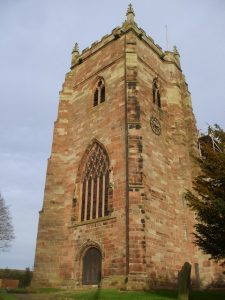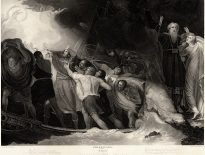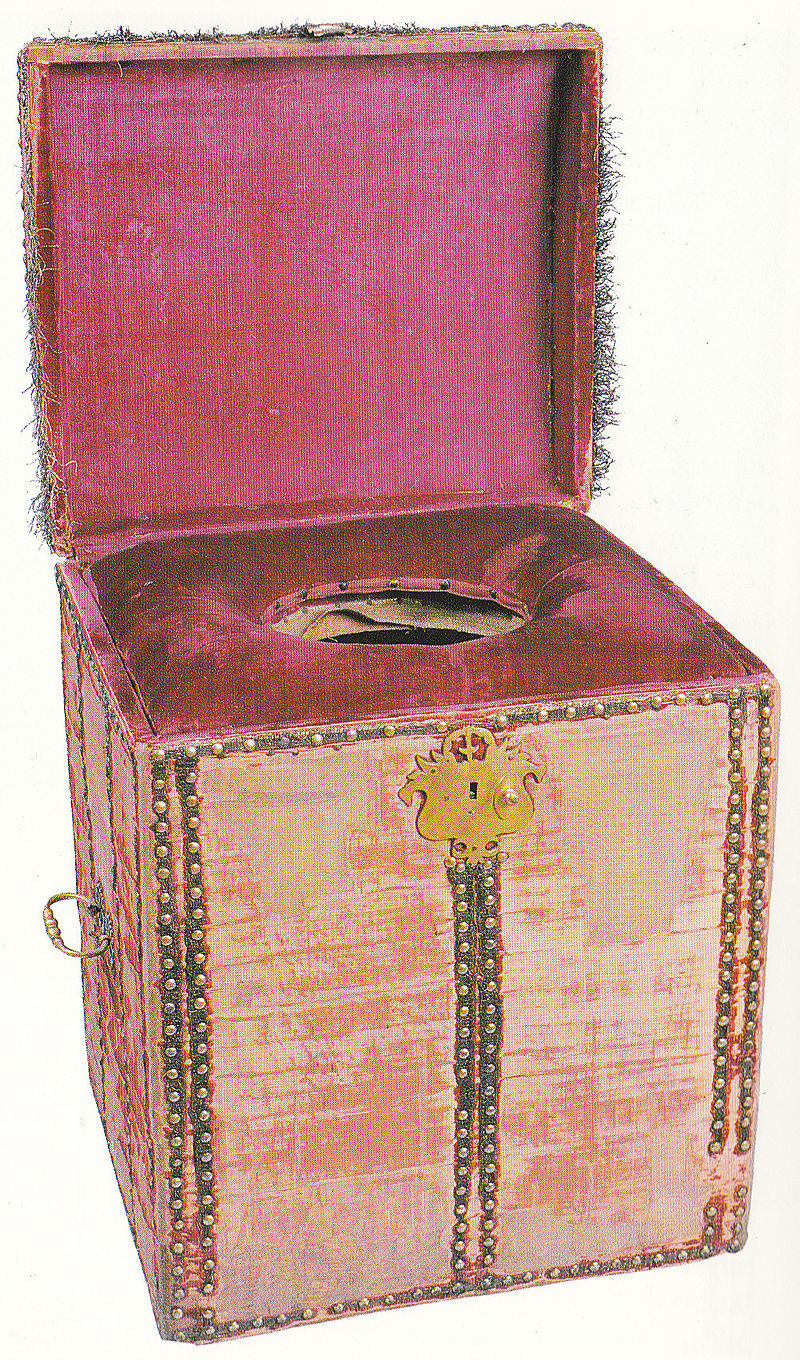
St Oswald's Church Tower, Malpas, Brereton's home town
William Brereton (or Bryerton) was the sixth son of a leading, landowning Cheshire family. He was born between 1487 and 1490; his father was Sir Randolph Brereton of Malpas, chamberlain of the county palatine of Cheshire. Randolph became a knight of the body in 1513. William's mother was Eleanor Dutton, daughter of Piers Dutton of Halton. Brereton, like three of his brothers, entered royal service and by 1524 (perhaps even 1521) he had become a groom of the privy chamber.
Eric Ives writes of how Brereton was "the dominant royal servant in Cheshire and north Wales" due to his wealth, his royal grants and his father's power in Cheshire. In the mid to late 1520s, he was able to secure the reversion of the stewardship of Longdendale, the position of sergeant of the peace in Bromfield and Yale, the lordship of Chirk, the escheator of the county palatine and ranger of Delamere Forest, keepership of Merseley Park, the post of sheriff of Merioneth and Flint, constable of Chester Castle and steward and controller of Halton – quite a list of offices, and those are just some of them! On his father's death, he was appointed Chamberlain of Chester. When Henry finally separated from Catherine of Aragon, Brereton was made receiver-general in Cheshire and Flint to Catherine, in her new position as Dowager Princess of Wales. Ives estimates that Brereton's gross income in the early 1530s was around £1300 a year, a large amount in those days.
In 1529/1530, Brereton married Lady Elizabeth Savage, widow of Sir John Savage of Clifton, Cheshire, and daughter of Charles Somerset, 1st Earl of Worcester, the King's second cousin. Her brother was Henry Somerset who had become the 2nd Earl of Worcester in 1526 on the death of his father. This marriage brought Brereton closer to the King, who trusted Brereton enough in 1531 to give him the job of delivering jewels to Anne Boleyn. He may also have been chosen to be present at the King's secret marriage, to Anne, in January 1533. Brereton's name was also on the list of those who attended Anne's coronation celebrations when Henry VIII dubbed around 50 knights bachelor.
Eric Ives also writes of how Brereton was in charge, helped by Thomas Wriothesley, of riding around the country in 1530 to collect signatures from the “elite of England” on a petition begging the Pope for Henry's divorce. Brereton's friendship with the King is shown also by the fact that he accompanied the King and Anne on many hunting expeditions and the fact that he enjoyed a multitude of royal grants and Crown offices. He was definitely a royal favourite.
William Brereton had a rather colourful reputation. It seems that he used his power and influence for his own gain, just as his father had. George Cavendish, Wolsey's faithful servant and biographer, describes him as someone who persecuted the innocent and who let personal animosity get in the way when he was doing his job. Cavendish gives the example of John ap Griffith Eyton, Brereton's former deputy, who was hanged in 1534. Eyton had accused Brereton of being involved in various offences: the robbery of cattle, the murder of a servant, the release of a monk guilty of treason, the murder of Eyton's uncle (Constable of Chirk) and another relative, and the murder of William Hamner at Bromfield. Brereton denied any involvement in the offences and blamed Eyton for the murder of Hamner. Even though Eyton was acquitted by a London court after complaining to the Star Chamber about Brereton, it is alleged that he was rearrested and imprisoned at Holt Castle in July 1534 and subsequently hanged.
Brereton was not a member of Anne Boleyn's inner circle and it appears that his arrest and execution as part of her fall in 1536 were more to do with his activities in Wales and his opposition to Thomas Cromwell's reforms there. Cromwell was planning further administrative reforms for Wales and did not want any obstacles in his path. He was the perfect fall guy for Cromwell, having already garnered a reputation for corruption. He may have been a corrupt character, but, as Sir Henry Norris's servant, George Constantine said, “yf any of them was innocent, it was he”. He was the odd one out.
With Brereton gone, his monopoly in Cheshire and North Wales was also gone. His offices were distributed between a few men – his brother Urian, Sir Piers Dutton, Sir Rees Mauncell and Hugh Starkey– so that the power was shared. Cromwell could now have his way in Cheshire and North Wales.
Note: Although the William Brereton of Showtime's "The Tudors" series was a Jesuit priest hired by the pope to assassinate Anne Boleyn, this storyline is completely fictional.
Notes and Sources
Based on an extract from Claire Ridgway's The Fall of Anne Boleyn: A Countdown (MadeGlobal).
- Ives, Eric. "William Brereton". Oxford Dictionary of National Biography. Oxford University Press, 2004.
- Ives, E W. Court and County Palatine in the Reign of Henry VIII: The Career of William Brereton of Malpas. Transactions of the Historic Society of Lancashire and Cheshire 123 (1971): 1–38.



Interestingly the parish Church aka original parish Church of Chester, St John’s has many memorials to various members of the Brereton family from the fourteenth to the seventeenth centuries. Two sat as Lord Mayor, one was on the King’s side in the English Civil Wars and the other, ironically another William was a Captain in the Parliamentary army which led the siege of Chester in the 1640s. Most are not graves but memorial markers, some originally on graves, others simply memorials. There are pre Raphelite paintings on the walls of Chester Town Hall which is Victorian Gothic and on the site of an older Hall depicting every Lord Mayer and City Elder for over seven centuries. It’s interesting that one family has so many connections to one particular county.
Malpas was a small market town on the Wales/Shropshire border, is of Saxon not Norman origin as many people believe and the Church is fourteenth century with Flemish windows. Today we actually consider it more of a large village than a town.
Yes, my father is from the area and told me about it being a very common name in the area. I love visiting Chester when I go and see my parents, such a beautiful place. I know Malpas too. When I was growing up, school holidays involved travelling from the Midlands through the Shropshire/Welsh border and on to North Wales to see one set of grandparents, and then on to Cheshire to see the other set. I have such fond memories of these places and enjoy revisiting it now that my parents have moved back to North Wales.
Yes we love Cheshire and North Wales, not too far and plenty to see and do. We have discovered the mid Marches recently, Shropshire, Wye area and love it just as much. We ventured to Staffordshire last year and I have a mad idea to go to Father Brown country, but I think North Wales first. I think Steve thinks I am quite mad as I love to visit Chester for 10 days in late September. It’s just a great city and base for exploring from. Our bolt hole will always be Arnside in South Cumbria, a tiny seaside village which won our hearts many years ago, two pubs, one seagull, a few sheep, lots of peace and quiet and a few quaint cafes and the one B and B, a small beech, hills, steam train and long walks. Even after 18 years still haven’t been everywhere close by. Some people think there is nothing to do. You would be surprised, but that’s how we like it. Same with North Wales. You can find anything you are interested in, if you look and it’s naturally beautiful as well.